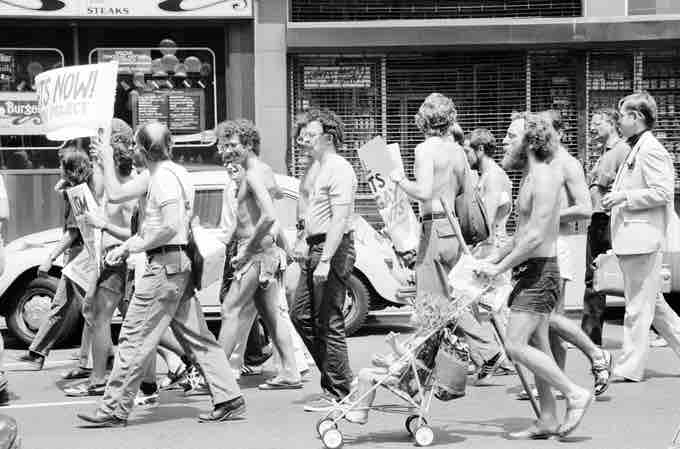Introduction
The LGBTQ rights movement refers to the efforts of individuals and organizations to improve the social and legal standing of lesbian, gay, bisexual, and transgender (LGBTQ) people. The Stonewall Riots of 1969 are often thought to mark the starting point of a worldwide LGBTQ rights movement. In fact, some gay and lesbian organizations were established earlier than 1969 and advocated for the improved social standing of LGBTQ people. Still, it was not until the second half of the twentieth century that LGBTQ advocates organized groups and demonstrations to improve the legal status of LGBTQ people.
Despite the long history of non-heterosexual sexual practices and non-conforming gender roles, the concept of lesbian, gay, bisexual, transgender, and queer/questioning (LGBTQ) rights did not become widely used until the second half of the twentieth century. In the early twentieth century in the United States, men and women engaged in homosexual practices and relationships but did not identify as "gay" or "lesbian. " In New York City in the 1920s, for example, men met in particular social clubs and bars to find male sexual partners. The majority of these men were married and did not consider themselves to be homosexual. While they engaged in homosexual conduct, they generally did not advocate for the improved standing of homosexuals in society. Likewise, throughout the early 1900s, well-educated, unmarried women sometimes lived with long-term female partners. While these relationships were often intimate and resembled marriage, and were sometimes colloquially referred to as "Boston marriages," the women in these partnerships were more often advocates for women's rights than for homosexual rights and did not identify as lesbians. The origin of the term "Boston marriages" refer to two single women living together, independent of men. The term was originally coined in Henry James' novel The Bostonians, which told the tale of an intimate companionship between two wealthy Boston women.
The Stonewall Riots
By the 1950s "homophile organizations" comprised of self-identified homosexual men and women arose. Like earlier social clubs and bars, these homophile club meetings served as a place to meet romantic and sexual partners. But, unlike earlier meeting places, homophile clubs explicitly advocated for the improved social status of homosexual people. While homophile organizations made early explicit attempts to improve LGBTQ peoples' status, it was not until The Stonewall Riots of 1969 that large numbers of LGBTQ advocates united to demand legal and social rights. Throughout the 1950s-60s LGBTQ people gathered in a small number of bars that welcomed them as customers. Police forces often kept track of which bars were frequented by homosexuals. Since homosexuality was still illegal under anti-sodomy laws, and LGBTQ people had no protections against discrimination, police raids on known gay bars were common.
Don't Ask, Don't Tell
"Don't Ask, Don't Tell" (DADT) was the official United States policy on gays serving in the military from December 21, 1993, to September 20, 2011. The policy prohibited military personnel from discriminating against or harassing closeted homosexual or bisexual service members or applicants, while barring openly gay, lesbian, or bisexual persons from military service.
The policy was introduced as a compromise measure in 1993 by President Bill Clinton who campaigned in 1992 on the promise to allow all citizens to serve in the military regardless of sexual orientation. In accordance with the December 21, 1993, Department of Defense Directive, it was legal policy that homosexuality was incompatible with military service and that persons who engaged in homosexual acts or stated that they are homosexual or bisexual were to be discharged. he "Don't Ask" provision mandated that military or appointed officials will not ask about or require members to reveal their sexual orientation. The "Don't Tell" stated that a member may be discharged for claiming to be a homosexual or bisexual or making a statement indicating a tendency towards or intent to engage in homosexual activities.
A congressional bill to repeal DADT was enacted in December 2010, specifying that the policy would remain in place until the President, the Secretary of Defense, and the Chairman of the Joint Chiefs of Staff certified that repeal would not harm military readiness, followed by a 60-day waiting period. A July 6, 2011, ruling from a federal appeals court barred further enforcement of the U.S. military's ban on openly gay service members. President Barack Obama, Secretary of Defense Leon Panetta, and Chairman of the Joint Chiefs of Staff Admiral Mike Mullen sent that certification to Congress on July 22, 2011, which set the end of DADT for September 20, 2011.
Successes and Challenges
Since the late-1960s, LGBTQ activists have achieved many successes in the struggle to secure civil rights for LGBTQ people. Notably, in the past decade many states have legalized same-sex marriages and civil unions, the federal government overturned a ban on open LGBTQ military service members known as Don't Ask, Don't Tell (DADT), and most states have passed anti-discrimination laws that prevent discrimination in housing, employment, and education on the basis of sexual orientation. Although gay marriage is legal nationally, and no federal law protects LGBTQ people from discrimination.

Gay Rights Demonstration
By the late 1960s, cities across the country held gay rights demonstrations to oppose discrimination on the basis of sexual orientation.